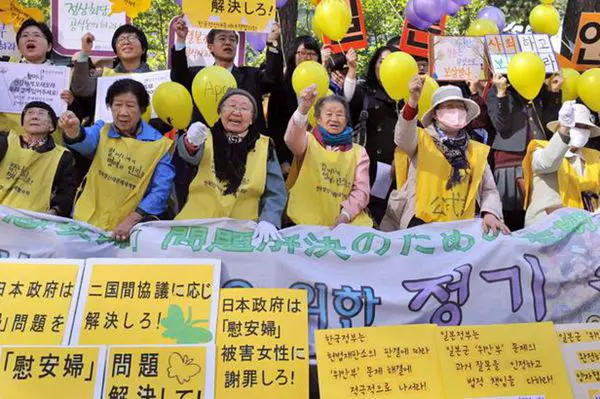A deal struck between Japan and South Korea purporting to finally end a long-standing rift between the two countries over the "comfort women" issue was lambasted Tuesday by two former Korean women who were forced to work in Japan's wartime military brothels.
While stating that the deal, involving Tokyo pledging to pay 1 billion yen (about 8.3 million U.S. dollars) into a South Korean fund for the 46 surviving comfort women, was derogatory and not based on the consent of the surviving former "comfort women," the two women have also demanded a fresh apology over the issue from Japan's Prime Minister Shinzo Abe.
"The deal is making a fool out of us. It was agreed without any consultations with us. How can they agree on the issue by pushing us aside? I'm furious," 87-year-old Kang Il Chul was quoted as saying at a press conference at parliament in Tokyo.
"It is as if the Japanese government is waiting for us to stop speaking out and die," said 88-year-old Lee Ok Son, who had also traveled from South Korea to attend the conference Tuesday.
The two women who currently live at the "House of Sharing," a group home for former "comfort women" near Seoul in South Korea, also demanded that Abe issue a formal apology and the government pays official compensation.
On Dec. 28, Abe, by proxy, renewed an official apology for the wartime travesty committed by Japan's military in WWII during its occupation, expressing his most sincere apologies and remorse to all those who suffered immeasurable and incurable physical and mental wounds as "comfort women."
Japan conceded that its current government recognizes its responsibility over the issue and the "grave affront to the honor and dignity of large numbers of women," caused by the Imperial Japanese Army during its occupation. The apology and admission of guilt seemingly cemented a new accord between Tokyo and Seoul to once and for all put the issue to bed, with both sides also agreeing to no longer antagonize each other over the issue on global platforms.
But Tokyo's pledge to contribute to a fund for the 46 remaining surviving comfort women, was quickly followed with the undiscussed stipulation that Seoul removes a statue of tribute to the women from near the Japanese embassy in Seoul.
The "comfort women" deal, while initially being hailed as a great step toward bridging a historical divide between Japan and South Korea and helping to reinstate diplomatic ties between Tokyo and Seoul, took a turn for the worse recently, however, when Abe and other senior Japanese politicians backtracked on their latest stance.
Abe, has, since the deal was made, stated that official records from neither the military nor the government prove "comfort women" were forced into sexual service and that the government had found no evidence of "forced mobilization" of the women by the military in official documents.
The U-turn by the prime minister was met with widespread condemnation by the former "comfort women" themselves, civic groups that represent them, as well as from countries other than South Korea who also saw mass-abuses inflicted on their women and girls by the Imperial Japanese Army during the war.
The hawkish leader has maintained that his government's fundamental position on the "comfort women" issue had not changed and no war crimes pertaining to the actions of the Imperial Japanese Army before and during WWII had been recognized by the state.
He also remarked that all of Japan's legal obligations related to the issue had been settled when ties were normalized with South Korea in 1965, further undoing what was first thought of as an historic step by Japan to admit its culpability.
Japan's Foreign Minister Fumio Kishida who brokered the new deal in South Korea and delivered Japan's apology from Abe on his behalf, has also rowed back on the government's stance since then, stating recently that the women forced to work in Japan's military brothels during the war should not be called "sex slaves, " saying the term "doesn't match the facts."
Another LDP-linked politician stating that the "comfort women" were prostitutes and not victims, has also rekindled the flames of enmity toward Japan over the issue.
The widely-used term "comfort women" is a euphemism used to describe the hundreds of thousands of girls -- including teenagers -- and women, largely from the Korean Peninsular, but also from other Asian nations, who were forcibly coerced into working in military brothels and serving members of the Imperial Japanese Army, during its brutal wartime occupation of the peninsular.
Tens of thousands of women aside from Koreans, from then occupied countries comprising women from China as well as the Philippines, Myanmar, Indonesia and those from the Netherlands and a contingent of Australian women, were also forced to service Japanese soldiers in wartime sex camps.
The Imperial Japanese Army also forced its own nationals to work in some of its military brothels.
 简体中文
简体中文



